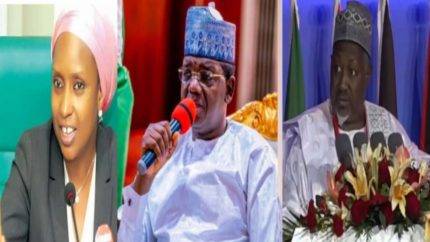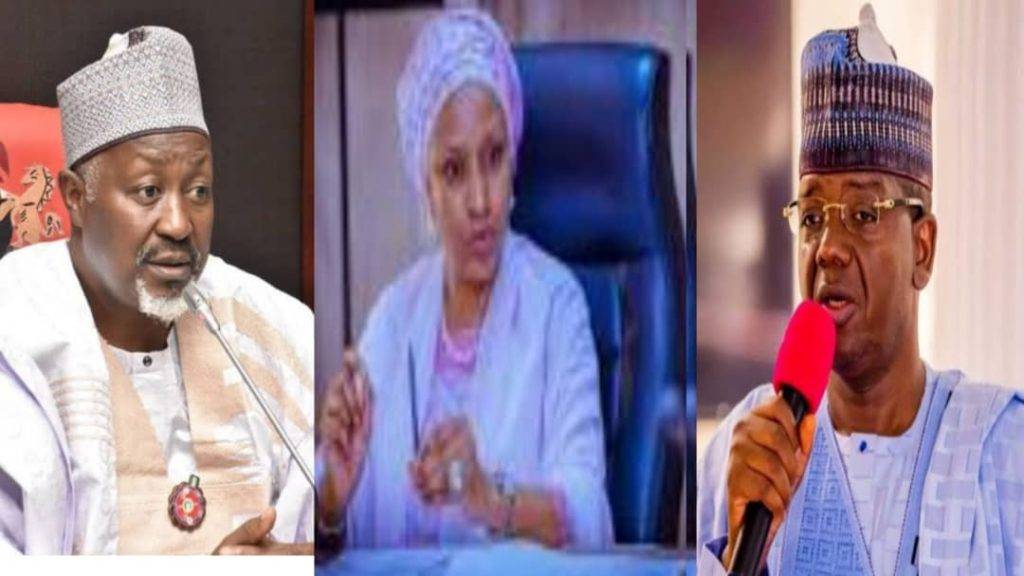High-Level Government Meeting on Policy Coordination: Hadiza Bala Usman’s Quarterly Assessment
In a significant development, Hadiza Bala Usman’s, the special adviser to the president on policy coordination, recently convened a crucial meeting with Defence Ministers Mohammed Badaru Abubakar and Bello Matawalle. This meeting marks the quarterly assessment of the ministers’ performance, with the anticipation that it will contribute to the formulation of an annual scorecard.
During the meeting, key policy issues and strategic initiatives were discussed, highlighting the government’s commitment to effective governance and policy implementation. The quarterly assessment is a proactive approach to ensure transparency, accountability, and continuous improvement within the defense sector. As these high-profile discussions unfold, it underlines the government’s dedication to fostering a robust and well-coordinated policy framework.
Strategic Collaboration: Hadiza Bala Usman’s Role in Enhancing Policy Effectiveness
Hadiza Bala Usman’s role as the special adviser on policy coordination comes to the forefront as she engages in strategic collaboration with Defence Ministers Mohammed Badaru Abubakar and Bello Matawalle. The meeting serves as a platform for aligning policy objectives with on-ground realities, ensuring a synchronized approach towards national defense.
This collaborative effort aims to address challenges, optimize resource allocation, and enhance the overall effectiveness of defense policies. By fostering a culture of open communication and cooperation, the government aims to bolster its policy coordination mechanisms. As the quarterly assessment progresses, it becomes evident that Usman’s role is pivotal in shaping a cohesive and responsive policy framework within the defense sector.

Quarterly Assessment Framework: Evaluating Ministerial Performance Metrics
The quarterly assessment initiated by Hadiza Bala Usman’s underscores a systematic approach to evaluating the performance of Defence Ministers Mohammed Badaru Abubakar and Bello Matawalle. This framework involves a meticulous analysis of key performance metrics, ranging from strategic policy implementation to resource management and overall impact on national security.
By employing a comprehensive assessment process, the government aims to identify areas of strength, address weaknesses, and guide future policy adjustments. This transparent evaluation mechanism not only holds ministers accountable but also contributes to the continuous improvement of defense policies. The resulting annual scorecard is expected to provide valuable insights into the overall effectiveness of the defense sector’s leadership.
Transparency and Accountability: Cornerstones of Policy Coordination
Transparency and accountability take center stage in the quarterly assessment led by Hadiza Bala Usman. The government’s commitment to these principles is evident as it evaluates the performance of Defence Ministers Mohammed Badaru Abubakar and Bello Matawalle. By fostering a culture of openness, the assessment process aims to build public trust and confidence in the government’s handling of defense affairs.
This emphasis on transparency extends beyond the assessment meeting itself, with efforts made to communicate the outcomes and policy adjustments to the public. As the government strives to keep citizens informed, it reinforces the importance of accountability in shaping policies that align with the nation’s security needs.

Public Expectations: Assessing the Impact of Defense Policies on National Security
The quarterly assessment initiated by Hadiza Bala Usman’s also addresses public expectations regarding the impact of defense policies on national security. This aspect reflects the government’s responsiveness to the concerns and aspirations of the citizens. By evaluating how defense policies contribute to safeguarding the nation, the government aims to assure the public that their safety and well-being remain top priorities.
This alignment with public expectations not only enhances the government’s credibility but also fosters a sense of national unity and collective security. As the assessment process unfolds, the government seeks to bridge the gap between policy formulation and public perception, ensuring a holistic approach to national defense.
Future Outlook: Anticipating Policy Adjustments and Strategic Directions
As the quarterly assessment progresses, attention turns towards the future outlook of defense policies. Hadiza Bala Usman’s engagement with Defence Ministers Mohammed Badaru Abubakar and Bello Matawalle sets the stage for anticipating policy adjustments and strategic directions. The insights gained from the assessment process will likely inform future policy decisions, ensuring a dynamic and adaptive approach to national defense.
The government’s commitment to continuous improvement and responsiveness to emerging challenges is evident in this forward-looking perspective. By adopting a proactive stance, the quarterly assessment becomes a catalyst for shaping policies that align with evolving security dynamics, reinforcing the government’s dedication to safeguarding the nation.
Table of Contents
Discover more from OGM News NG
Subscribe to get the latest posts sent to your email.













